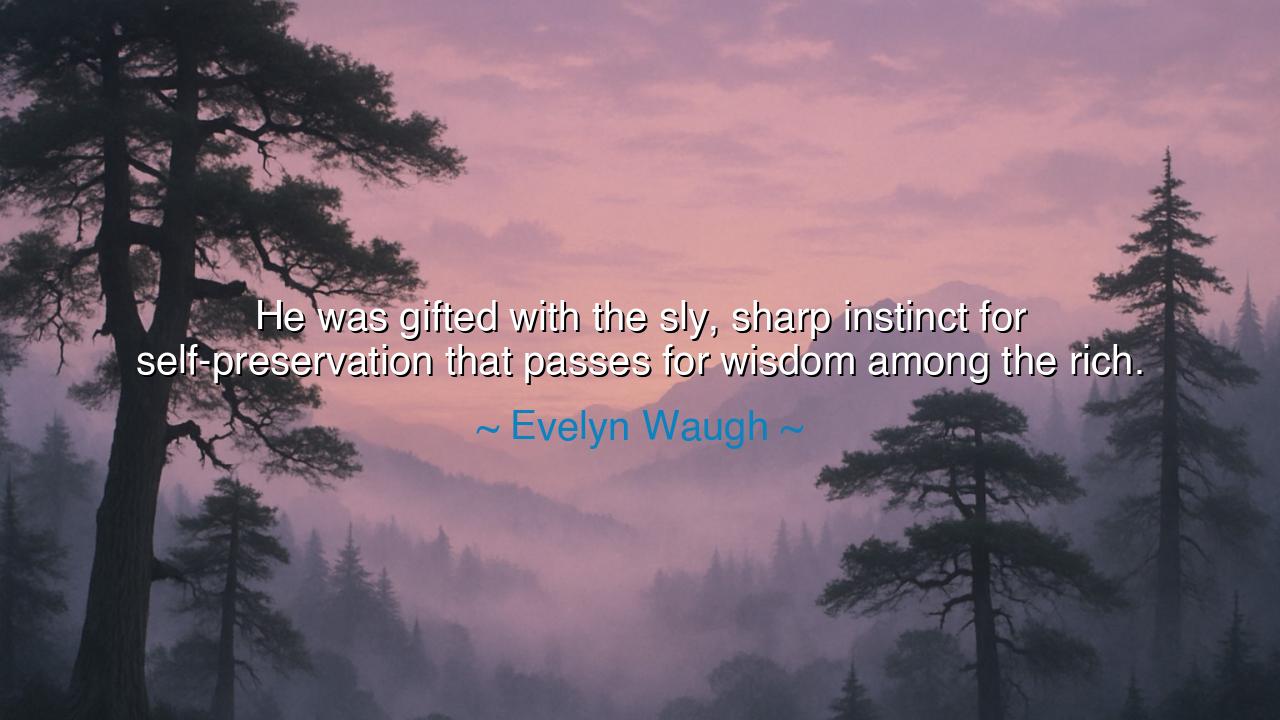
He was gifted with the sly, sharp instinct for self-preservation
He was gifted with the sly, sharp instinct for self-preservation that passes for wisdom among the rich.






Evelyn Waugh, with his piercing tongue, speaks of a man gifted with a sly, sharp instinct for self-preservation, a trait that in the realm of the rich masquerades as wisdom. Here lies not true wisdom, born of virtue and reflection, but a counterfeit—an art of survival cloaked in elegance. It is the cunning of the privileged, who, fearing loss more than dishonor, guard themselves with subtlety and calculation. In this way, what should be noble is made small, and what should be guiding light becomes shadow.
The meaning is bitter but clear: among those who dwell in wealth, the instinct to protect fortune, reputation, and influence often takes the place of genuine virtue. To move carefully, to avoid risk, to flatter the powerful and retreat from danger—these things earn them the name of “wise,” though in truth they are but strategies of fear. It is a survival of the fittest not in spirit, but in the preservation of privilege.
History shows us many such figures. Consider Talleyrand, the French diplomat who served kings, revolutionaries, and emperors alike. He shifted allegiances with the wind, surviving regimes that crushed others beneath their weight. Some called him wise, for he endured and prospered while chaos consumed France. But was this wisdom? Or was it the sly instinct of self-preservation, polished with charm and wit? His name endures not for greatness of soul, but for cleverness in surviving the tides of history.
Waugh reminds us that such “wisdom” is hollow. It does not inspire, it does not ennoble; it only sustains. The rich may praise themselves for it, mistaking caution for clarity, and self-interest for vision. Yet, when tested against the measure of true greatness—courage, sacrifice, truth—it falters. For the instinct to preserve self at all costs is the enemy of noble action.
Therefore, let the seeker of truth not confuse the art of survival with the light of wisdom. To live long is not to live well, and to preserve comfort is not to preserve the soul. Better the fate of those who fall with honor, like Leonidas at Thermopylae, than the long, safe life of one who bends and twists only to endure. For wisdom is not in clinging to life, but in giving life meaning.






MMilk
I can’t help but read this as both satire and tragedy. Waugh seems to suggest that the wealthy redefine wisdom to justify their own behavior. But I wonder—does this apply only to the rich, or to anyone who confuses fear with foresight? Maybe what he’s really exposing is human nature’s tendency to moralize self-interest. If wisdom becomes indistinguishable from self-preservation, then doesn’t it lose its higher purpose entirely?
TDHuynh Thanh Duy
There’s a certain cold brilliance in this line. It suggests that in some social circles, moral values are inverted—self-protection and manipulation become signs of intelligence. It makes me wonder how class and wealth shape definitions of virtue. If the poor call sacrifice noble and the rich call caution wise, then wisdom itself seems relative. Is Waugh mocking that relativity, or lamenting that genuine wisdom can’t survive in a world obsessed with status?
UGUser Google
This quote stings because it feels relevant even now. It highlights the moral difference between being clever and being wise. The rich may call it wisdom when they avoid loss, but maybe it’s just self-interest polished with sophistication. I’m curious whether Waugh meant this as pure satire or a deeper social critique. Does privilege inevitably warp perception, making survival tactics look like insight? Or is he exposing a universal human hypocrisy?
TVThuy Van
I find this statement deeply ironic. It implies that what passes as ‘wisdom’ among the elite is actually just calculated selfishness. It makes me question whether wealth isolates people from moral growth, forcing them to see the world only through the lens of protection and advantage. Can someone who’s always guarding their comfort truly be wise? Perhaps wisdom requires a willingness to risk something, while self-preservation is its opposite—fear disguised as prudence.
CLNguyen Thi Cam Ly
This observation feels bitingly cynical but also honest. It makes me wonder whether Waugh is criticizing the way society confuses cunning with wisdom. Among the wealthy, survival often seems to mean maintaining power and privilege, even at the cost of integrity. Is self-preservation really a sign of intelligence, or just moral compromise dressed up as virtue? Maybe this line exposes how easily success can distort our idea of what it means to be wise.